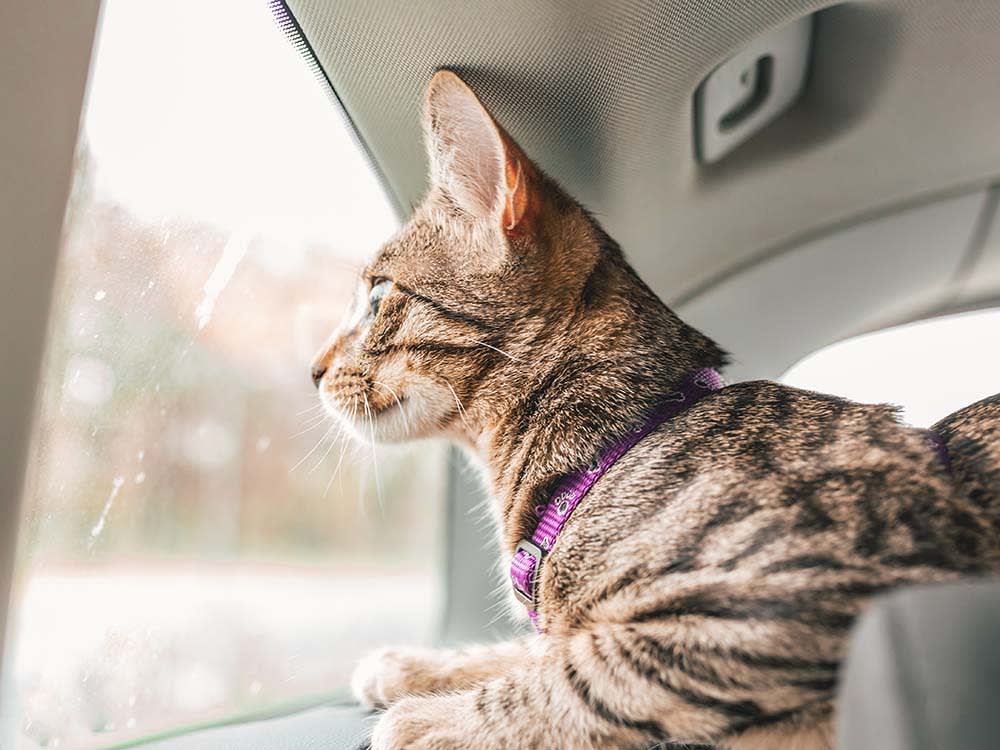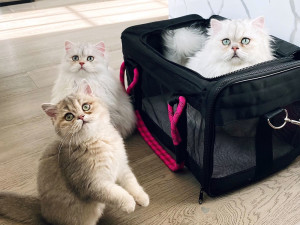How to Move with a Cat (and Keep Yowling to a Minimum)
Cat behaviorist Cristin Tamburo’s pro tips on how to survive a week in a car with not one, but two cats.

Share Article
Last winter, we moved from California to Iowa. But in the time leading up to it, we agonized over how to get our cats from point A to point B with the least amount of trauma to cat (and human) possible. You see, our cats, Koneko and Chickpea, don’t have the best track record on the road: The last time we moved, from Los Feliz to downtown LA, they spent the entire 20 minutes yowling as though they were being tortured. Iowa, well, was a week away, so we were looking forward to four to six hours a day of driving — yes, and yowling. Below, tips for traveling with a cat, from someone who’s been there.
Expect Some Yowling
Wherever we were on the trip, there was Chickpea, meowing in the background, relentlessly, endlessly mrraow, mrraow, mrraowing at approximately 46 beats per minute. Thankfully, he did calm down when we landed in our hotel rooms; while driving however, he somehow kept the rhythmic yowl going for nearly six days.

Save on the litter with color-changing tech that helps you better care for your cat.
Seek Out Cat-Friendly Hotels
Speaking of bringing cats into hotels, make reservations in advance and absolutely confirm that the place you’re planning to stay in is “cat friendly,” not just “pet friendly,” which more often than not translates to “dog friendly.” Apparently cats aren’t…pets? Best Westerns are one of the few chains that allow cats, but still check with each individual hotel and be aware that you will be charged a pet fee. If you don’t confirm this before you land at your nightly destination, you may find yourself and your travel-weary kitty camping out in the car.
Stock Up on Calming Medication
While we were armed with lots of cat snacks, CBD, and — in the event of “break glass in case of emergency” desperation — full-on cat tranquilizers supplied by our vet, cat behaviorist Cristin Tamburoopens in a new tab has some other tips that, in retrospect, would have been nice to know at the time.
Invest in a Travel-Safe Cat Carrier
Tamburo also recommends having a cat carrieropens in a new tab on hand that is large enough to accommodate kitty litter, and that you give your cat(s) time to get used to the carrier before the trip. Owing to space limitations, this was another situation that was less than ideal for our cats, as we had them in large pet backpack carriers, equipped with pee pads (which only one of the cats made use of, once, on the trip).
Microchip Your Cat
Last but not least — but before hitting the road — Tamburo recommends microchipping your cat(s) in case they get scared and try to run off at a rest stop. There is, after all, a spectrum of cat comfort when it comes to long-distance travel. Koneko represented one end, remaining supremely chill for six days, while, well, I’ve already indicated what end Chickpea represented.
However much you might strive to avoid an unpleasant trip for both you and your cats, you might just have a cat who hates traveling, a relentless Chickpea, on your hands. And in that case all I will leave you with a last assurance: though you might wonder how a cat can meow that much without wearing out entirely from the stress, your cat will survive. And, most importantly — once you’ve reached your final destination and settled in to your new home — even thrive.

Robb Fritz
Robb Fritz is a writer, digital editor, producer, and content creator. He has previously written for McSweeney’s Internet Tendency where he penned a column entitled “History’s a Bitch: A Dog Walk Through Time.” He is now expanding his writing to include cats, which makes sense as he lives with two of them, along with his wife and daughter. They recently moved from LA to the much smaller town of Fairfield, Iowa, where they are surrounded by deer, geese, and a lot of cottontail.

